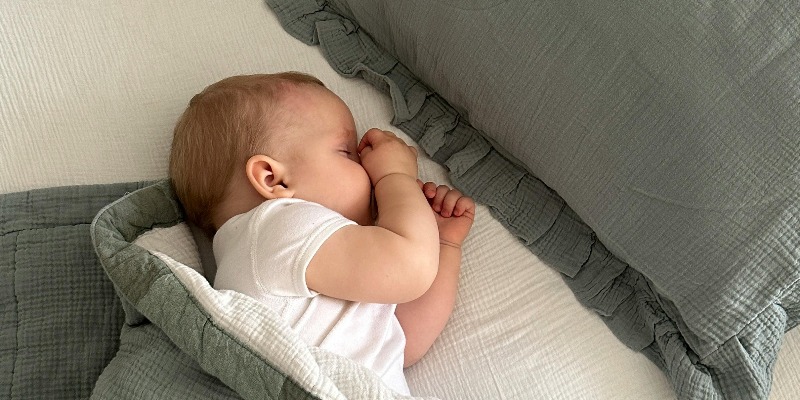Top 7 Pet-Friendly Hotels in the USA: Perfect Stays for You and Your Furry Friends
The World’s Greatest Places of 2024 – Your Dream Destinations!
15 Stylish Thanksgiving Home Decor Ideas for the Holidays
The Best Kitchen Tiles in 2024: Brands, Types and Prices
6 Strategies to Balance your Work and Home with Ease
7 Best Mental Health Activities For Kids
Must-Have Gadgets to Make Elementary School Easier
8 Tips for Raising Independent Kids: Encouraging Self-reliance
10 Effective Baby Sleep Hacks: Establishing a Bedtime Routine
No parent appreciates spending the hour leading up to bedtime battling with a restless infant who won't sleep no matter how much you try to put them to sleep. Getting your kid to sleep well begins long before you place them in their crib. If you want your baby to sleep better and get some rest yourself, try establishing regular bedtime hacks.
No parent appreciates spending the hour leading up to bedtime battling with a restless infant who won't sleep no matter how much you try to put them to sleep. Getting your kid to sleep well begins long before you place them in their crib. If you want your baby to sleep better and get some rest yourself, try establishing regular bedtime hacks.
Therefore, the best way for a newborn to understand that it is time to sleep is to establish a regular nighttime routine. If you want to be able to repeat your newborn's bedtime reliably hacks no matter where you are, then it's best to keep it as simple as possible.
Regular Schedule for Putting a Baby to Sleep
You can't overstate the significance of establishing a regular schedule for your baby's bedtime. Your child will fall asleep more quickly; hopefully, both of you can sleep through the night. A regular nighttime routine for your newborn is important for the following reasons:
1. Babies often have more restful nights when they adhere to a regular pattern.
2. Babies find new things all the time and are very curious. Your infant might be stimulated by the tiniest of things or by your very presence.
3. Your infant will be more relaxed and ready to sleep if you establish a regular sleep schedule.
4. Your newborn will sleep better if they know what to expect from night to night, so keep your schedule as regular and predictable as possible.
In the meantime, you'll get some peaceful time to bond with your young one, who will likely find this routine soothing and easier to fall asleep. Also, regular nighttime rituals ease the transitioning stages. Having a regular schedule for putting your kid to sleep can be especially helpful during transition or regression in sleep.

Sleeping Hacks for Putting Your Baby to Bed
Babies typically establish routines for feeding, playing, and sleeping around the six-week mark. You will know how to begin your routine by looking at your notes on what calms and soothes your baby.
Get into a schedule after you know your baby's signs that they're getting sleepy. Establishing it will require time, so be consistent! When putting your newborn to bed, keep these bedtime routines and hacks in mind:
Hack 1: Keep Track of How Often and How Deeply Baby Sleeps
Spend some time watching how your baby naturally sleeps before you start a regular nighttime regimen. While a newborn's sleep schedule is completely unexpected initially, you may notice patterns during the sixth and eighth weeks.
Note: when you see sleepiness indicators, such as yawning, eye-rubbing, or fussiness. Using this data, you can establish a regular nighttime schedule.
Hack 2: Establish a Precise Internal Clock
Your observations should inform your selection of a regular start time for the nightly routine. Setting your baby's internal clock requires precision, but even a 15 to 30-minute window will help.
Hack 3: Keep It Simple
Also, the temptation to make a long list of things to do to get your baby ready for bed is real, but remember that less is more. Pick up three or four soothing activities; make sure they're both easy for you to do regularly and soothing for your baby.
Hack 4: Determine the Sequence of Events
Do the same sequence overnight once you've settled on a pattern. As time passes, your infant will recognize this pattern and associate it with the impending arrival of bedtime.
Hack 5: Work Together as a Team
Consistency is key, so ensure all careers are included in the nightly ritual. No matter who is putting the baby to bed—you, your partner, or even a grandparent—it's important that everyone knows what to expect and how to follow the process.
Hack 6: Make Your Space More Conducive to Sleeping
A lot of what tells your infant it's time to sleep is the air around them. Keep the temperature, turn the lights, and turn the noise down. The preferences of your infant will determine if gentle background noise or lullabies are helpful for you. However, some parents find them to be helpful.
Hack 7: Establish a Sleep Signal
Include a brief "goodnight" muttered or a light pat on the back as a last sleep trigger at the end of the ritual. This cue will help your infant associate the two concepts more rapidly by serving as the last signal before bedtime.
Hack 8: Keep Being Flexible While Being Consistent
As your child develops, their demands will evolve. Be adaptable in your approach while keeping the routine's structure and regularity. Keep the remainder of the newborn's nighttime routine the same and try a different activity if one isn't working.
Hack 9: Evaluation Regularly
Be ready to adjust the newborn night routine when your baby reaches new developmental milestones. After major changes, such as when a child starts teething or crawling, or every few months, reevaluate.
Hack 10: Safety First
Above all else, make sure your infant is safe before bedtime by following these measures. Ensure their sleeping area is clutter-free and follow all safety precautions.
Depending on your child, you should begin the baby's bedtime routine as early as possible. On the other hand, one hour to fifteen minutes is the sweet spot for a newborn's nightly routine before bed. Your baby's disposition and even the day's events will play a role.

A Life Bedtime Routine
It can take longer to calm them down if they have a busy day full of guests or lots of playtime before bed instead of a tranquil day spent snuggling up with mum. Below is a typical Example of A nighttime routine:
1. Bathe your baby, change his diaper, and apply lotion, etc., 45 minutes to an hour before bedtime.
2. 30–45 minutes before bedtime: wrap baby in a blanket, put on pyjamas, and give them a brief massage to help them fall asleep. Dim the lights and turn on some background noise.
3. 15-20 minutes before bedtime: Eating, nursing, or engaging in anything else that helps you relax.
4. Your infant should be extremely sleepy five minutes before bedtime. Before their slumber, you could place them in their crib.
5. Take a short break from the room as your infant nods off.
Hacks for Your Baby’s Bedtime
Hopefully, you will find this guidance helpful in establishing a regular pattern for your baby's bedtime. Even though you might be dealing with irregular sleep schedules now, you can bring stability to your life by using these recommendations for a newborn bedtime routine.










